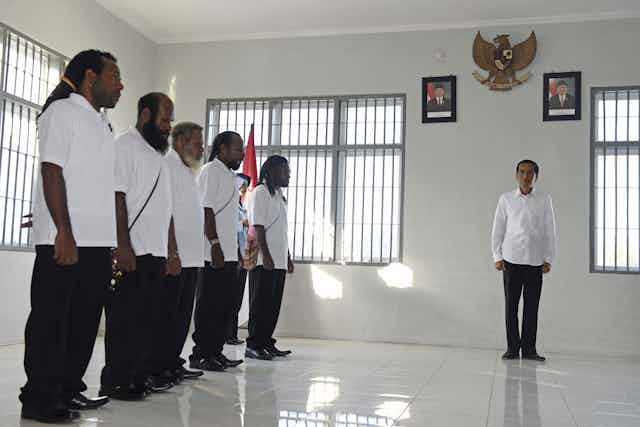In September, Jakarta-based French journalist Marie Dhumieres decided to test whether Indonesia’s decades-long barring of foreign media from Papua had indeed ended. In May, the Indonesian government had announced it would lift restrictions for accredited foreign journalists wanting to report on the Papua and West Papua provinces.
For decades, foreign journalists had to submit to a long and complex bureaucratic process to gain access to the region, where widespread public dissatisfaction with Jakarta and a small but persistent pro-independence insurgency exist. Minders from the intelligence agency would shadow the rare journalists who received permission, controlling their movements and restricting access to sources on the ground.
Dhumieres got lucky. The government gave her a police permit to visit Papua.
On October 1, she flew from Jayapura, Papua’s provincial capital, to Pegunungan Bintang to interview independence activists. She did not experience any police harassment or surveillance during her trip.
Her travelling companion, a Papuan activist, was not as fortunate. A week after Dhumieres had returned, police detained him and two of his friends. The police interrogated them for ten hours. Dhumieres responded by tweeting her dismay to Indonesian President Joko Widodo:
Papua’s media freedom challenges
A recent Human Rights Watch report shows that the ordeal of Dhumieres’ activist companions was no accident. Although Indonesian authorities have granted foreign journalists access to Papua, often after months of jumping through “bureaucratic hoops”, government obstacles to foreign media access linger.
The bureaucratic impediments range from demands for details of itineraries and focus of news coverage to the need to supply multiple “recommendation letters” from prospective interviewees/sources in order to get official permission to visit Papua.
These obstacles reflect Indonesia’s deep ambivalence to allowing greater foreign media access to Papua. In some cases, officials and members of the police and the military are outright hostile to the idea.
That hostility is rooted in more than 25 years of government suspicion of foreign nationals’ motivations in the troubled region.
By declaring Papua open to foreign journalists, Widodo – known as Jokowi – symbolically fulfilled a promise he made as a presidential candidate in June 2014.
But so far he has yet to put the change in writing via presidential instruction. Meanwhile, various government officials and military commanders have made a series of contradictory statements regarding foreign media access to Papua. This suggests Jokowi’s administration lacks a coherent, unified policy on lifting restrictions on foreign media access to Papua.
The challenges to media freedom in Papua are compounded by obstacles faced by Indonesian journalists – particularly ethnic Papuan reporters. Local journalists who report on sensitive political topics and human rights abuses are often subject to harassment, intimidation and violence by officials, members of the public and pro-independence forces.
No research allowed
In addition to media freedom challenges, the Indonesian government effectively blocks access to Papua by foreign academic researchers.
The government has often monitored, harassed and deported foreign academics who in recent years have attempted to do research in Papua. In at least two cases documented by Human Rights Watch, the government has imposed visa bans on Australian academics for their contact in Australia with Papuan independence groups.
Anthropologist Eben Kirksey of Princeton University noted:
I have been working [on Papua] since 1998, negotiating access in a legal situation where all basic science is viewed as being an inherently suspicious activity. In effect, almost all official applications to conduct research [there] are rejected by Jakarta.
Damien Kingsbury, a professor at Deakin University in Australia, also came under surveillance by security forces in Papua during a research trip to the region in 2003. He said:
When you check into the hotel [in Papua], the guest list is checked [by Indonesian security forces], as it was in Aceh. You are monitored and you have to be very careful.
In 2003, Indonesia carried out a military operation in Aceh to crack down on the separatist movement.
Scott Burchill, also from Deakin University, has never visited Papua nor applied for an official Papua access permit. But the Indonesian government placed him on a visa blacklist. In 2006, Burchill had given public talks to Papuan independence groups.
The experiences of both foreign journalists and academics indicate that the Indonesian government’s sensitivity to Papua access is deeply ingrained and that parts of the government are strongly resisting change.
To genuinely open Papua to foreign media, Jokowi must bridge the gap between rhetoric and reality. He should follow through on his commitment by issuing a presidential directive that specifies the obligations of government ministries and security forces to ensure unobstructed foreign media access to Papua.
The government should extend this commitment to unimpeded Papua access to foreign researchers. This will provide a much-needed legal foundation for foreign media and academics to assert their right to travel there and to resist efforts to deny that right.
Phelim Kine co-wrote this article with Andreas Harsono, senior researcher on Indonesia at Human Rights Watch.

